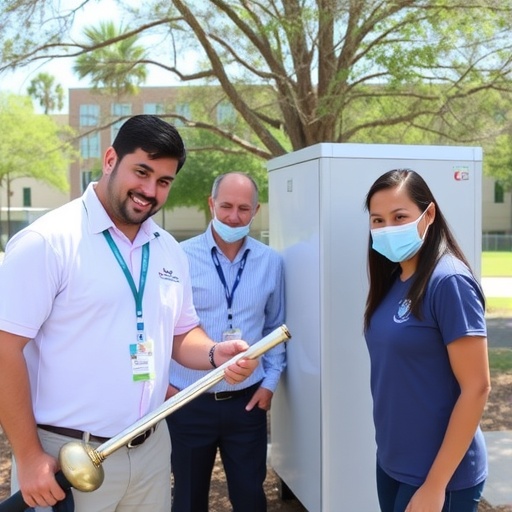The University of North Florida (UNF) is preparing to launch a cutting-edge heat exercise laboratory on its campus in Jacksonville, slated to open in the spring. This collaboration between UNF’s Korey Stringer Institute (KSI at UNF) and Perry Weather represents a pioneering effort to advance the scientific understanding and practical management of heat-related exertional stress and exertional heat stroke, a condition that threatens athletes, military personnel, and laborers alike in heat-intense environments.
KSI at UNF builds upon the legacy of the Korey Stringer Institute, nationally recognized as the foremost authority on exertional heat stroke prevention. Perry Weather, an innovative weather safety platform with expertise in environmental monitoring and data analytics, brings state-of-the-art instrumentation and software into this union. The laboratory’s integration of lab-based controlled environments with real-world field research empowers it to gather critical physiological and environmental data, providing new insights into how heat stress impacts human performance and safety.
The physical home of this new laboratory will be Hicks Hall, facilitating a collaborative academic hub where student athletes, researchers, and faculty across diverse disciplines—including athletic training, kinesiology, biomedical sciences, nutrition, and dietetics—can converge. The lab’s mission transcends academia, extending its services to Jacksonville’s broader community of professional athletes, military members, and laborers engaged in physically demanding work in high-heat conditions. This cross-sector collaboration aims to generate actionable heat mitigation strategies to enhance productivity and, crucially, prevent fatalities caused by heat stress.
Perry Weather’s technology will provide unparalleled real-time environmental data regarding heat and weather conditions, which, when synchronized with physiological metrics captured under the guidance of KSI researchers, will reveal nuanced relationships between environmental stressors and the human body’s responses. This synergy will enable scientists to formulate empirically grounded recommendations for work-to-rest ratios, hydration protocols, and other heat mitigation tactics tailored specifically to the varying demands faced by athletes and outdoor workers exposed to extreme climates.
“We see Jacksonville as a strategically vital location for this initiative, not only because of its persistent heat but also due to the diverse and large populations at risk, ranging from youth athletes to labor-intensive occupations and military personnel,” stated Dr. Douglas Casa, CEO of KSI. He emphasized how the new laboratory is poised to extend KSI’s reach into Florida and beyond, empowering safer heat-exposure practices informed by precise environmental monitoring and physiological research.
The lab’s leadership includes former KSI personnel from the University of Connecticut, ensuring continuity and the import of decades of expertise in exertional heat stroke science. Dr. Michael Szymanski, the newly appointed director and assistant professor, alongside Dr. Gabrielle Brewer, the associate director and postdoctoral research associate, bring seasoned perspectives crucial for advancing research and applied practice at UNF. Their backgrounds position the laboratory at the forefront of exertional heat science, combining academic rigor with practical application.
At the heart of this collaboration is the memory of Korey Stringer, a Minnesota Vikings offensive lineman whose tragic death due to exertional heat stroke in 2001 catalyzed the formation of the original Korey Stringer Institute in 2010. His wife, Kelci Stringer, alongside experts like Dr. Casa, sparked a movement toward scientifically informed prevention strategies that have since reshaped safety protocols across sports and occupational settings nationwide.
The partnership with Perry Weather introduces a critical technological dimension: the deployment of advanced monitoring networks that measure environmental variables such as temperature, humidity, radiant heat, and wind speed. These variables are integrated through sophisticated software platforms that provide easily interpretable real-time alerts and weather forecasts specifically tuned for exertional heat risk assessment. This technological infrastructure allows for dynamic, data-driven decision-making that can adjust training, work schedules, and safety policies instantaneously.
Beyond research, the heat exercise laboratory at UNF will function as an advisory resource, offering on-site evaluations and consultations to organizations, companies, and policymakers. This service will critically analyze existing heat mitigation strategies, review regulatory frameworks, and propose evidence-based best practices to enhance heat safety across various settings. This translational approach ensures that scientific advances efficiently enter real-world applications, markedly reducing heat-related morbidity and mortality.
Colin Perry, CEO of Perry Weather, highlighted the significance of this joint venture, pointing out that the modern challenges posed by climate change and increasing global temperatures necessitate innovative solutions. The heat exercise laboratory represents a forward-thinking investment in the safety of athletes and outdoor workers, embodying a model for how data-driven interventions can revolutionize health management in the face of environmental hazards.
The interdisciplinary nature of this project underscores its potential impact. UNF students and faculty from multiple programs will have unparalleled access to cutting-edge resources, providing a fertile training ground for future scientists, clinicians, and safety officers. The laboratory’s work will not only contribute to academic scholarship but also firmly embed the principles of heat safety within the local and national practice communities.
Through the application of physiology, environmental science, data analytics, and public health principles, the laboratory stands as a beacon of innovation against a backdrop of rising heat-related challenges worldwide. As heat waves become more frequent and intense, the imperative for institutions like KSI at UNF and Perry Weather to lead evidence-based prevention measures grows ever more urgent.
In summary, the establishment of this advanced heat exercise laboratory marks a pivotal moment in the intersection of sports science, occupational health, and environmental safety. It promises to yield critical knowledge and practical tools that will protect some of society’s most vulnerable populations during exposure to severe heat stress, ultimately honoring Korey Stringer’s legacy through science and actionable prevention.
Subject of Research: Exertional heat stroke prevention, environmental monitoring, human physiological responses to heat stress, heat mitigation strategies for athletes and laborers
Article Title: University of North Florida to Open State-of-the-Art Heat Exercise Laboratory in Partnership with Korey Stringer Institute and Perry Weather
News Publication Date: Not specified
Web References:
Keywords: stress responses, heat exercise laboratory, exertional heat stroke, weather monitoring, environmental data, athlete safety, occupational heat stress, physiology, heat mitigation, real-time environmental monitoring




